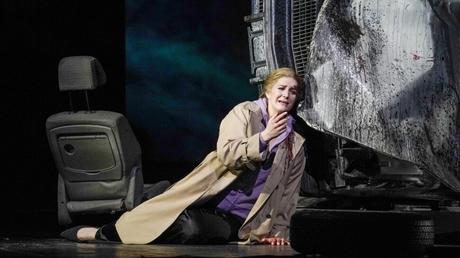
Norwegian soprano Lise Davidsen as Leonora in Verdi's "La Forza del Destino" (Photo: Met Opera)
Being away from blog writing for a while takes its toll, especially when it comes to opera, movies, and the arts. This post aims to make up for that absence. It's time, I reckon, to set the record straight on some of my favorite topics. And brother, do we have a lot to say!
We've been busy storing up enough fodder to make some headway - and voice some opinions - on what's been happening to the world's oldest, if not the most expensive, stage, vocal, visual, artistic, and dramatic art forms. And we mustn't forget the literary realm as well.
We'll begin with overviews of past accomplishments, laced with some current fare, and finish up with whatever the future holds.
There Were Voices Back ThenGood opera recordings - even mediocre ones - have been extremely hard to come by lately. The drought can be attributed to online streaming services, market saturation, and various other electronic means. We'll get into the details in a moment.
Gone are the days when long-playing records, compact discs, and video cassettes (remember those?) were the ultimate in sound and visual quality. The old mantra of "the more, the merrier" has been replaced by "less is more," where supply no longer needs to meet demand as was once thought.
What this means, to many ears (mine, especially), is that singers and other artists seem to have lost their individuality. By that, I mean that a vocalist's specific sound quality has faded into the background. It's become increasingly difficult to distinguish one soprano's voice (to take an example) from another's within the same vocal category.
For instance, where's the uniqueness of quality and artistry that we found in Maria Callas? Let's stick with the soprano category for now: from Renata Tebaldi, Zinka Milanov, Joan Sutherland, Leontyne Price, Montserrat Caballé, Mirella Freni, and Renata Scotto, to Birgit Nilsson and Leonie Rysanek - where are their equivalents today?
Once you've heard the quality, the timbre, the amplitude, the body, and the vibrance intrinsic to these artists in their prime, there's no mistaking one for the other. These singular aspects are what made each artist unique in their specific repertoire or chosen field.
Lately, I've been constantly challenged to pick out a truly exceptional voice from the profusion of dull, same-old, nondescript, and otherwise undistinguished representatives currently out there. With few exceptions (I'll name them later), most artists today have shown an appalling lack of vocal personality.
The same holds true for complete opera recordings. It's not that there's a lack of new albums, but the market for such expensive endeavors seems to be much less inviting and, consequently, much less rewarding for the average listener.
Let's take an earlier generation's views of Mozart's Don Giovanni. Treasured albums were plentiful, but the most favored ones starred Italian basso Cesare Siepi, who displayed the full range of this defiant antihero's persona: the brio and youthful vigor so worthy of this outstanding artist. Siepi had personality to spare, evident in his two recordings (first on London, then on RCA Victor). Other artists, including Giuseppe Taddei, Dietrich Fischer-Dieskau, Eberhard Wächter, and the thicker-voiced George London, have brought their own unique blend of word painting and vocal dexterity to the part, each in their own way.
The same goes for the Duke of Mantua in Verdi's Rigoletto, as represented on records by such singers as Alfredo Kraus, Giuseppe Di Stefano, Jussi Bjoerling, and Carlo Bergonzi - all four masters of the bel canto style, who brought character to life through words, phrasing, and vibrant musical expression. Later on, Luciano Pavarotti, Plácido Domingo, and José Carreras (aka "The Three Tenors") also brought instantly recognizable vocal personalities to the formula, along with a wealth of vivacity and passion.
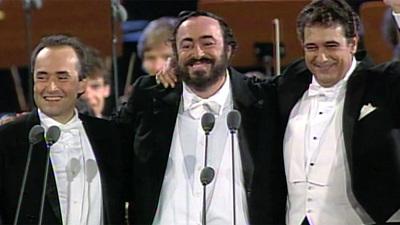
Where is that vivacity and passion today? Even in Wagner, whose music demands a dedication and discipline of the highest order, there seems to be a lack of vocal and histrionic distinction. For example, there's been a lot of buzz lately around Norwegian soprano Lise Davidsen, whose great height and stage presence led to instant recognition. Even more prominent was her powerful voice and stellar lung capacity, both of which bode well for a major career in Wagner and Strauss, where she is most needed.
However, I challenge listeners to discern an individual personality or stamp of recognition in many of her stage interpretations. Her Leonora in last season's Met Opera premiere of Verdi's La Forza del Destino (a new production) left me wanting more pointed direction of the text, more variable pitch, and more noticeable development of her character as the opera progressed, despite the clunky "modern times" production.
True, Davidsen possesses a stupendous voice that stands out by virtue of its uniqueness, achieving recognition in today's barren waste landscape where voices of such amplitude are rare. Soprano Kirsten Flagstad, her great predecessor, once possessed such a voice, as did others in the so-called Golden Age of Vocal Idols.
Madame Flagstad's artistry was a gift from God and nature, as was Lotte Lehmann's, and countless others besides. But has Ms. Davidsen truly taken her gift to the loftiest of heights - that "Vocal Valhalla" of which we yearn? That remains to be seen.
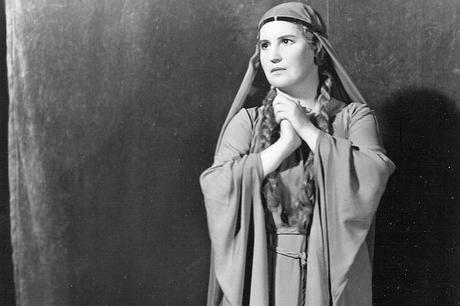
The great Kirsten Flagstad as Isolde in Wagner's "Tristan und Isolde"
Our problem today is the veritable lack of such voices in practically all vocal categories. It's not just about size and scope, mind you. Even smaller voices can project well into large spaces - Bidu Sayão did it, as did Lily Pons, and many of their contemporaries. The trick is in how to project a singer's sound quality over a huge orchestra: not so much by vocal heft or sheer lung power - although that would be the ideal - but by clearer, more pointed, more directed enunciation of the text.
Yes, big voices were plentiful at one time. I need only cite the outpourings of Mario del Monaco, one of my personal favorites, or Franco Corelli, or Richard Tucker. However, my theory is this: as miniaturization took over the computer and broadcast industries; as solid-state components, single-chassis construction, and smaller-scale projects changed how products were marketed and sold, and as the downsizing of movies and the manner in which they, too, were presented and viewed changed (through online-streaming services, laptops, cell phones, and other digital devices), that "bigness" we once favored and luxuriated in has gone out of style, replaced by smallness.
To quote Norma Desmond in Billy Wilder's Sunset Boulevard, "I am big! It's the pictures that got small!"
"Florencia in the Amazon" and at the MetFirst of all, let me say how delighted - how absolutely thrilled - I was to finally hear the late Mexican-born composer Daniel Catán's two-act opera Florencia en el Amazonas. It was broadcast on December 9, 2023, as part of a Live from the Met transmission.
Amid all the advance hoopla about having an opera sung in Spanish - a language spoken by a gazillion people around the world, with an equally large audience right here in the USA - listeners were indeed deliriously ecstatic about finally understanding what was being sung.
My "displeasure," if that is the correct term, lay with the opera itself and the relatively thin plot line. In broadcast interviews, Chicago-born soprano Ailyn Pérez, a Mexican descendant who sang the title role, was overjoyed to portray the diva Florencia Grimaldi. Ms. Pérez earned - and deserved - the lion's share of the ovation she received for her stellar performance. Her final apotheosis, where the diva literally transforms into a butterfly, was delivered with appropriate emotional intensity and sincerity.
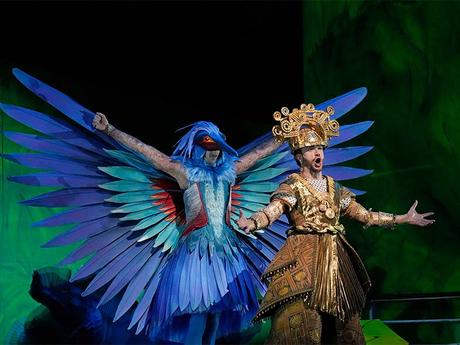
"Florencia en el Amazons": End of Act I, with Mattia Olivieri as Riolobo (Photo: Met Opera)
Would that the other cast members had risen to her challenge! Still, blame for any shortcomings can be laid on the composer himself and his librettist, Marcela Fuentes-Berain, for a significant lapse in providing engaging characterizations.
Tenor Mario Chang, as Arcadio, was stretched to his limits by the high-lying tessitura of his role, though he managed to survive the ordeal; meanwhile, mezzo-soprano Nancy Fabiola Herrera, as Paula, sounded dry and hollow in the higher reaches of her part.
The problem I had with Florencia was its lack of story. The work hums along with a repetitive quality, evoking the flowing current of the Amazon River as it winds its way through the thick jungle - both widening and narrowing, much like the steamboat that carries its passengers on a perilous voyage.
This is all well and good, but it makes for precious little content - certainly not enough to sustain a full evening (or afternoon, in this case) of opera. The few exchanges between characters are barked at full throttle. Subtlety goes overboard and out the steamboat's window, with the exception of Florencia herself.
Riolobo, a "major" character in that he is a native guide, practically disappears toward the end. And the little steamer's Captain, ably voiced by bass-baritone Greer Grimsley, has even less material to work with. Still, I'd like to hear Italian baritone Mattia Olivieri, as Riolobo, take on early Verdi, Rossini, Donizetti or Bellini. Of all the participants, his was the voice that stood out above the others.
Getting back to the plot, one keeps waiting for something to happen, but that emotional impact never happens. As a result, the entire affair ends without much consequence, leaving the listener flat.
I know that I've praised this work as one of the few in the standard repertoire that features Brazil and the Amazon jungle as backdrop and setting (for the background of this work, see the following link: https://josmarlopes.wordpress.com/2012/10/10/taking-flight-on-florencias-fragile-wings-daniel-catans-brazilian-opera/.) Perhaps performing the opera in Brazilian Portuguese would have helped (I can't see why it would have hurt!). But there's precious little that could be done with the story except, perhaps, introducing new music and bits of business between the proceedings.
Missed OpportunitiesMy dismay can also be aimed at the Met Opera management and other opera houses for overlooking the rich variety of Brazilian opera, i.e., specifically those by native composers like Antonio Carlos Gomes and Heitor Villa-Lobos, to name a few. A golden opportunity was missed by their absence.
For starters, Villa-Lobos wrote several fascinating works, two of them near the end of his life: A Menina das Nuvens (or "The Girl from the Clouds"), a lovely fairy-tale like children's opera written in Portuguese; and the much more dramatically intense Yerma, based on García Lorca's play and sung in that playwright's native Spanish, of all languages.
From my exposure to these works, I can safely state that there are more melodies and meaningful situations in each of them than in most of Florencia en el Amazonas - with the prominent exception of Florencia's final apotheosis in the last ten minutes, a marvelous "Love-Death" that brings to mind the mighty handiwork of Richard Wagner's Tristan und Isolde.
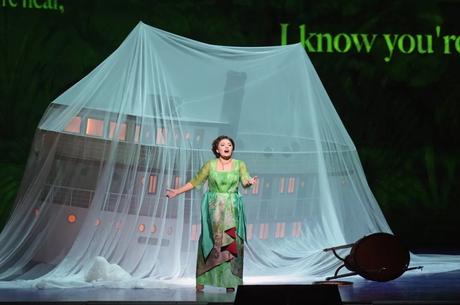
Ailyn Perez as Florencia Grimaldi in "Florencia en el Amazonas" (Photo: Met Opera)
I know my opinions may be countered by those with opposing viewpoints. I don't blame them. But I would be doing Florencia en el Amazonas a disservice if I were not completely honest about my feelings. My views were guided by a simple sense of "expectation" for something more than what was initially perceived.
The rule, therefore, is this: "Don't expect the expected, but rather the unexpected." I was hoping for something along the lines of Puccini's La Bohème, or Verdi's Rigoletto and La Traviata. How naïve of me! The irony of Florencia en el Amazonas is that the heroine transforms into the Emerald Muse Butterfly - but the work itself never takes flight.
Her wings were clipped before she ever left the ground.
(To be continued....)
Copyright © 2024 by Josmar F. Lopes
